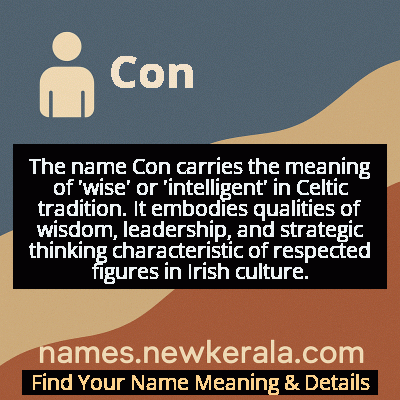Con Name Meaning & Details
Origin, Popularity, Numerology Analysis & Name Meaning of Con
Discover the origin, meaning, and cultural significance of the name CON. Delve into its historical roots and explore the lasting impact it has had on communities and traditions.
Name
Con
Gender
Male
Origin
Celtic
Lucky Number
5
Meaning of the Name - Con
The name Con carries the meaning of 'wise' or 'intelligent' in Celtic tradition. It embodies qualities of wisdom, leadership, and strategic thinking characteristic of respected figures in Irish culture.
Con - Complete Numerology Analysis
Your Numerology Number
Based on Pythagorean Numerology System
Ruling Planet
Mercury
Positive Nature
Adventurous, dynamic, curious, and social.
Negative Traits
Restless, impatient, inconsistent, prone to indulgence.
Lucky Colours
Green, white.
Lucky Days
Wednesday.
Lucky Stones
Emerald.
Harmony Numbers
1, 3, 9.
Best Suited Professions
Sales, marketing, travel, entertainment.
What People Like About You
Versatility, charisma, adventurous spirit.
Famous People Named Con
Con O'Neill
Irish Chieftain
Last independent Gaelic ruler of Clandeboye in Ulster
Con Colbert
Irish Revolutionary
Executed leader of the 1916 Easter Rising
Con Houlihan
Journalist and Writer
Celebrated Irish sports journalist known for lyrical prose
Con Martin
Footballer
Legendary Irish international footballer for Aston Villa and Leeds
Name Variations & International Equivalents
Click on blue names to explore their detailed meanings. Gray names with will be available soon.
Cultural & Historical Significance
Throughout Celtic history, names beginning with 'Con-' were particularly prestigious, often reserved for nobility and leaders believed to possess both intellectual acuity and physical prowess. The cultural significance extends beyond Ireland to other Celtic regions, where similar name forms appear in Welsh, Scottish Gaelic, and Breton traditions, always maintaining connotations of leadership, wisdom, and strength. The name represents a connection to Ireland's heroic age, when wisdom was considered as valuable as physical strength in leadership.
Extended Personality Analysis
Individuals named Con are typically perceived as possessing sharp intellect, quick wit, and natural leadership qualities. They often demonstrate exceptional problem-solving abilities and strategic thinking, approaching challenges with both creativity and practicality. Their wisdom isn't merely academic but manifests as street smarts and emotional intelligence, allowing them to navigate complex social situations with ease. Cons tend to be observant and analytical, preferring to assess situations thoroughly before acting, which can make them appear reserved initially but proves invaluable in decision-making.
They often serve as trusted advisors in their social circles, offering insights that balance logic with intuition. While they can be fiercely independent, they also value deep, meaningful relationships and are known for their loyalty to those who earn their trust. Their combination of intelligence and emotional depth makes them both respected leaders and compassionate friends. The name suggests someone who embodies the Celtic ideal of the complete person - strong in body, sharp in mind, and warm in heart.
Modern Usage & Popularity
In contemporary times, Con remains a popular name choice, particularly in Ireland and among the Irish diaspora, though it's often used as a shortened form of longer names like Connor or Conor rather than as a standalone given name. The name has maintained steady popularity due to its strong Celtic roots and appealing simplicity. In recent decades, there's been a resurgence of interest in traditional Celtic names, which has benefited shorter forms like Con. It's particularly favored by parents seeking names that are both culturally significant and modern-sounding, appearing across various social backgrounds while remaining most common in communities with Irish heritage.
Symbolic & Spiritual Meanings
Symbolically, Con represents the fusion of ancient wisdom with contemporary strength, embodying the Celtic ideal of the wise warrior who leads through intelligence rather than brute force alone. The name carries connotations of guardianship and protection, harkening back to its potential connection with words meaning 'hound' or 'wolf' - animals revered in Celtic culture for their loyalty, intelligence, and protective instincts. It symbolizes the bridge between tradition and modernity, connecting ancient Celtic values with contemporary leadership qualities, and represents the integration of rational thought and emotional intelligence that creates effective leadership.

